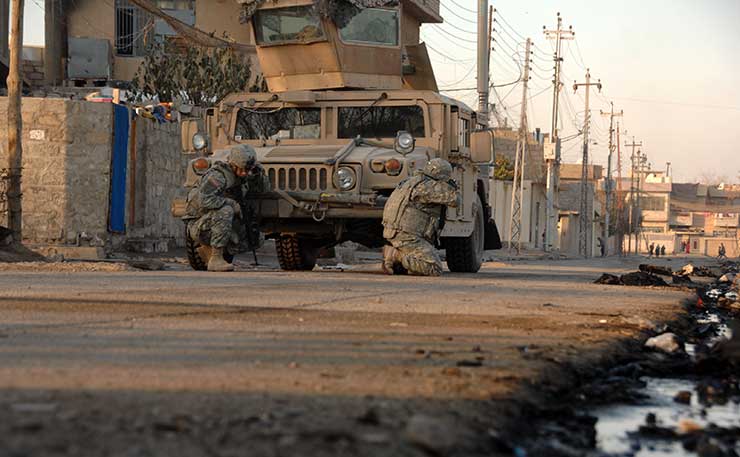It’s a decade and a half since Australia helped launch the invasion of Iraq, an attack which destabilised an entire region which today remains in chaos. Michael Brull looks back on the response of the left to the drum beats of war, and whether or not it did enough.
As I write this, it is 15 years since Australia joined the US and the “coalition of the willing” in invading Iraq. Though 11 September 2001 is regarded by many as having changed the world, and marking a shift in US foreign policy, the invasion of Iraq profoundly destabilised the Middle East. The myriad problems caused by the invasion spread across the region, and ultimately have affected countries across the world.
In mid-2006, a study was published in the prestigious medical journal The Lancet. Conducted by Johns Hopkins University and Iraqi university Al Mustansiriya, with cooperation from the Massachusetts Institute of Technology, it estimated that some 650,000 excess Iraqis had died since the invasion. It was consistent with a study published in late 2007 that found that 1.2 million Iraqis had been killed.
Iraqi novelist Sinan Antoon noted that “no-one knows for certain how many Iraqis have died”. The governments who perpetrated the war are “still at large”, and the experts haven’t been fired, let alone discredited. A prime example is Jeffrey Goldberg, the insufferable liberal “journalist” who has fallen upwards after every round of pumping out American and Israeli propaganda. Now, incredibly, he is the editor-in-chief at the Atlantic.
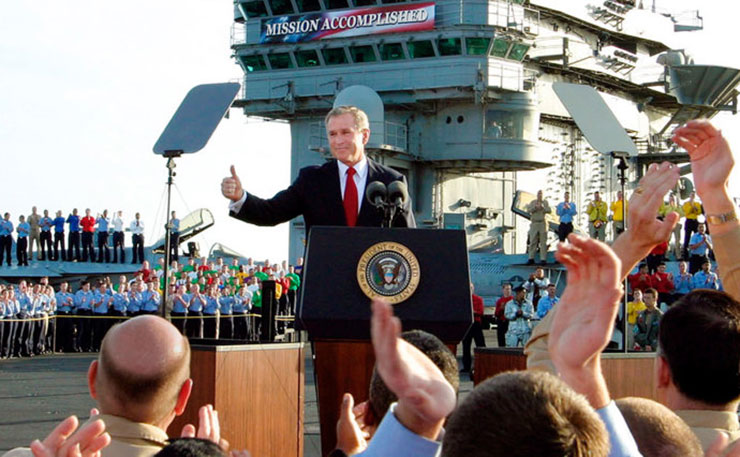
There was also the case of the media elevation of Arabs who pleaded with the West to invade Iraq. Perhaps the most prominent was Iraqi exile Kenaan Makiya. Building his career as a pundit with venomous attacks on the left, he predicted invading soldiers would be greeted with “sweets and flowers”.
Here, I don’t want to rehash the catastrophe in Iraq again, or how it paved the way for ISIS. Rather than focussing on all the awful people who got everything wrong – and how it boosted their careers – it’s interesting to revisit how the Left performed.
As is well known, there were massive protests around the world, including in Australia. Greens like Senator Kerry Nettle campaigned against the war, and journalists like John Pilger fiercely opposed it. I thought I’d read through the archives of Counterpunch, a prominent American left publication and see how it held up. Counterpunch (CP) constantly ran attacks on the war. From the start of the so-called War on Terror in September 2001, CP denounced US imperialism and military invasions.
In the lead-up to the war in 2003, Alexander Cockburn, one of the editors, and a terrific writer, constantly used his column to trash the war and its boosters. In February 2003, he praised the “largest outcry in history” against the “imminent aggressors”, and dissected a “major chunk of agitprop” for the war by “the hack” Goldberg. In January, he ridiculed President George W Bush and his courtiers in the press: “One has to go back to the lesser Roman emperors of the second century to find an imperial suzerain as dismal as Bush.” Dismissing the “thicket of brazen fictions”, he discussed “Bush’s speech, if one can dignify same with a word intended to designate ordered rhetoric”.
In March, Cockburn observed that “the Bush/Powell rationales for attacking Iraq for possessing Weapons of Mass Destruction has been spectacularly demolished, not least by UN inspectors Elbaradei and Blix. It has become surreal to follow the determination with which most of the mainstream US press ignores these demolitions”.
In the 48 hours before the war started, Cockburn began, “Bush’s ultimatum concludes one of the most disastrous attempts to sell a war in the history of diplomacy. Seldom has one country (or 1.25 if you add in the rest of the US alliance) so rapidly become such a target of sarcasm and ridicule in the eyes of the world.”
A week into the war, Cockburn began writing that the war was “in big trouble”. For the corporate media, it would take years to acknowledge any difficulties.
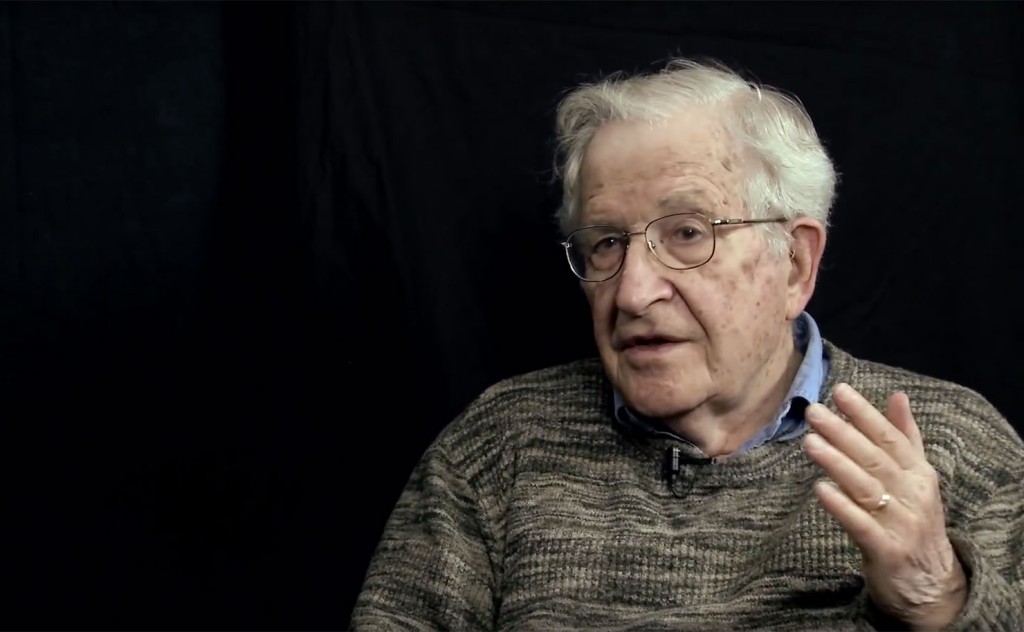
CP constantly ran critiques on the war from lesser-known figures, who remain obscure. But it also ran a column by Noam Chomsky, satirically suggesting in Swift-ian style that if the case for war was serious, a better case could be made for Iran invading Iraq. After discussing the many advantages of this invasion being undertaken by Iran, Chomsky concluded, “Granted, the modest proposal that Iran liberate Iraq is insane. Its only merit is that it is far more reasonable than the plans now being implemented – or it would be, if the administration’s professed goals had any relation to the real ones.”
Later Nobel Literature Laureate Harold Pinter had a poem denouncing the war and “America’s God”. The Black Commentator republished some of their anti-war essays, such as “Why Black Americans Should Oppose Bush’s War”. Leftist historian William Blum suggested some reasons for the invasion, like oil and empire. UK Leader of the House of Commons Robin Cook’s resignation from Tony Blair’s cabinet in protest of the war was reprinted. British veteran Middle East correspondent Robert Fisk wrote devastating analyses of the impending war, warning that “we are threatening the innocent, torturing our prisoners and ‘learning’ from men who should be in the dock for war crimes. This, then, is our true memorial to the men and women so cruelly murdered in the crimes against humanity of 11 September 2001.”
Veteran British-Pakistani anti-war author and activist Tariq Ali tirelessly denounced the war. It “is now obvious to a large majority of the world’s population that the real threat to peace and stability comes not from the depleted armouries of decaying dictatorships, but from the rotten heart of the American Empire or its regional satrapies. There is no support for this war anywhere in the Arab world. A near-universal view is that if waged and won, far from being seen as a deterrence, it would greatly facilitate the growth of mass support for terrorist groups.” He warned that, “Till now the Arabs have watched and suffered in silence, but this passivity is deceptive. There is growing anger and signs of unrest in every capital. There have been large demonstrations in Saudi Arabia and Egypt. The region could erupt if the ‘war against terror’ is extended to Iraq.”
Standing in their own league are the pre-war essays by the late, brilliant Palestinian scholar, Edward Said. Said wrote “The clash of civilisations that George Bush and his minions are trying to fabricate as a cover for a pre-emptive oil and hegemony war against Iraq is supposed to result in a triumph of democratic nation-building, regime change and forcible modernisation a l’americaine. Never mind the bombs and the ravages of the sanctions which are unmentioned.” In February: “It has finally become intolerable to listen to or look at news in this country.”
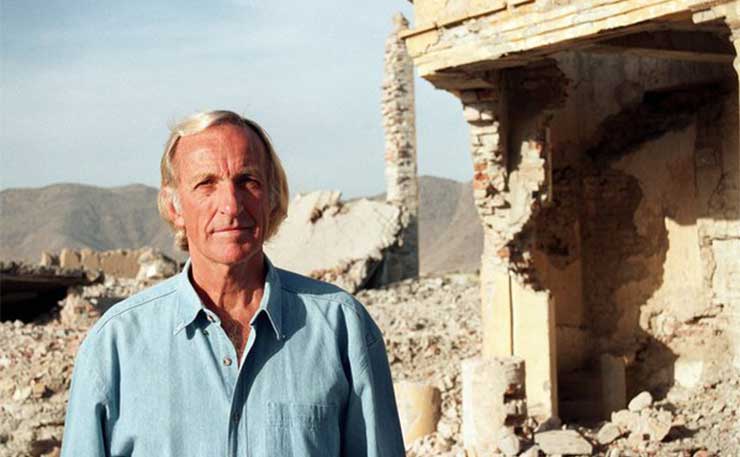
Of leading government figures, Said cried out, “Isn’t it outrageous that people of such a dubious calibre actually go on blathering about bringing democracy, modernisation, and liberalisation to the Middle East? God knows that the area needs it, as so many Arab and Muslim intellectuals and ordinary people have said over and over. But who appointed these characters as agents of progress anyway?”
Said went on,
“Colin Powell’s speech, despite its many weaknesses, its plagiarised and manufactured evidence, its confected audio-tapes and its doctored pictures, was correct in one thing. Saddam Hussein’s regime has violated numerous human rights and UN resolutions. There can be no arguing with that and no excuses can be allowed. But what is so monumentally hypocritical about the official US position is that literally everything Powell has accused the Ba’athists of has been the stock in trade of every Israeli government since 1948, and at no time more flagrantly than since the occupation of 1967.”
Said observed, “… that Bush and Sharon have contempt for the non-white people of this world is clear. The question is, how long can they keep getting away with it?” Said noted the massive anti-war protests, and stressed these should be linked to other issues of injustices:
“Our job as Arabs is to link our opposition to US action in Iraq to our support for human rights in Iraq, Palestine, Israel, Kurdistan and everywhere in the Arab world – and also ask others to force the same linkage on everyone, Arab, American, African, European, Australian and Asian. These are world issues, human issues, not simply strategic matters for the United States or the other major powers.”
During the war, much of the earlier protests fell away. Tariq Ali debated Christopher Hitchens a few times, the latter’s ridiculous apologetics not dating very well. Hitchens would continue to tout for years after the invasion that somehow weapons of mass destruction were around somewhere, and derided the “puerility” and boringness of people who said there were no WMDs and no links to al Qaeda. He also dismissed these kinds of concerns as overly literal. In berating these unsophisticates, he smugly observed that, “There were predictions made by the peaceniks, too, that haven’t come literally true, or true at all. There has been no refugee exodus, for example, of the kind they promised. No humanitarian meltdown, either. No mass civilian casualties.”
British politician George Galloway had a more entertaining debate with Hitchens, though Galloway’s talent as an orator is marred by his praise for Iraqi dictator Saddam Hussein, and Syrian dictator Bashar al-Assad.
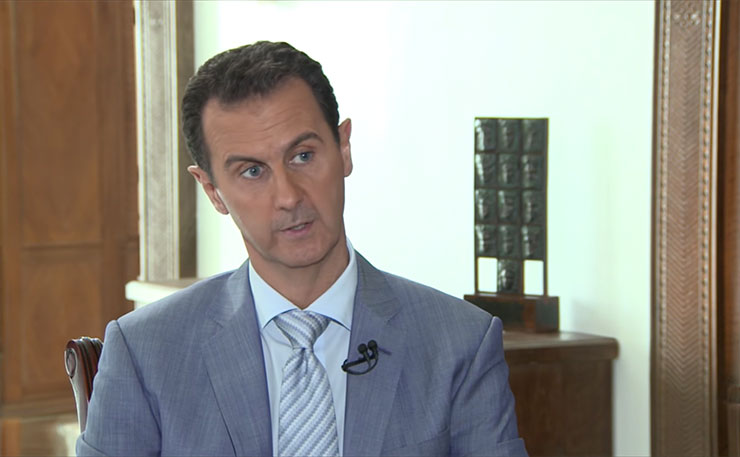
However, the anti-war movement died down as the war went on. Part of the problem was a paucity of connections between Iraqis and the international left in aggressor countries, and another part of the problem was the weakness of the left generally. Being right didn’t count for much, because it wasn’t really the thing that mattered. As the war in Iraq devolved into civil war, outside observers were unable to understand the role their countries had played in creating that conflict. They were told that the situation would worsen if Western countries abandoned the mess they had created.
The anti-war movement hardly played a role in the end of the occupation, and were in no position to object to the new campaign of Western bombing in Iraq and Syria in recent years.
In 2006, former CIA veteran Ray McGovern confronted Defense Secretary Donald Rumsfeld about those missing WMDs. McGovern asked why Rumsfeld lied about WMDs.
RUMSFELD: I didn’t lie.
McGOVERN: You said you knew where they were.
RUMSFELD: I did not. I said I knew where suspect sites were and we were … just … (crosstalk)
McGOVERN: You said you knew where they were Tikrit, Baghdad, northeast, south, west of there. Those are your words.”
Rumsfeld denied that. Turning to the facts, Rumsfeld’s words were “We know where they are. They’re in the area around Tikrit and Baghdad and east, west, south and north somewhat.”
The anti-war movement – and the radical left – were right from the start. It didn’t take much, the propaganda for the war was thin and mostly hard to take seriously. One telling analysis even came from 1994. The US government had decided against toppling Saddam during the 1991 Gulf War.
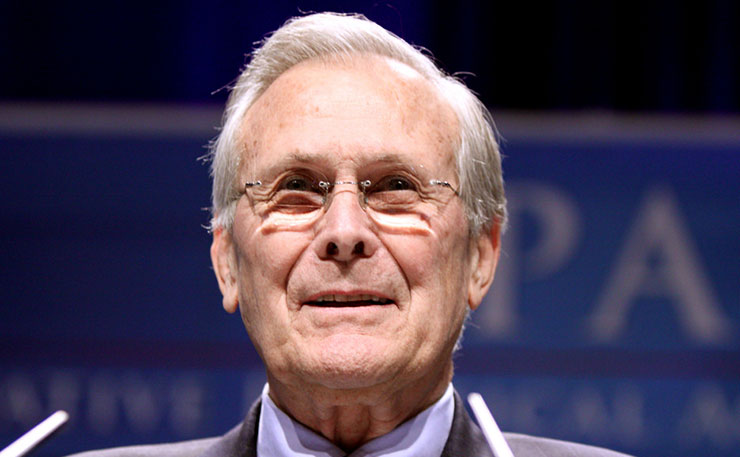
Why not move onto Baghdad? Because “we would have been all alone. There wouldn’t have been anybody else with us. There would have been a U.S. occupation of Iraq. None of the Arab forces that were willing to fight with us in Kuwait were willing to invade Iraq.” And once Saddam is gone, “then what are you going to put in its place? That’s a very volatile part of the world, and if you take down the central government of Iraq, you could very easily end up seeing pieces of Iraq fly off”.
Countries like Syria and Turkey would fight for influence. “It’s a quagmire if you go that far and try to take over Iraq.” Plus the risk of “casualties” – American, of course – had to be factored in.
The man with that sober analysis in 1994 was Dick Cheney, later to become the Vice-President who was widely regarded as an architect of the war.
Understanding that the war was bullshit and would be a disaster didn’t require technical expertise in chemical weapons. It didn’t require advanced mastery of the Middle East. It didn’t require defence of Saddam Hussein, who was loathed by all of the above (other than Galloway). It required a healthy scepticism of the corporate media, American power and militarism. It required a willingness to disbelieve respectable liberal analysis in the leading papers and journals of high-brow opinion.
Whilst we were right about the war, we need to learn from our failure to stop it. To forge a more meaningful and lasting movement, that can counter imperialist wars in the Middle East and wherever might get invaded next, we could do worse than listening to Said’s advice.
That is, our job as leftists is to connect our opposition to the war in Iraq, to support for human rights across the world, and build links of solidarity with other communities. That is what it will take to stop the next Iraq.
Donate To New Matilda
New Matilda is a small, independent media outlet. We survive through reader contributions, and never losing a lawsuit. If you got something from this article, giving something back helps us to continue speaking truth to power. Every little bit counts.

